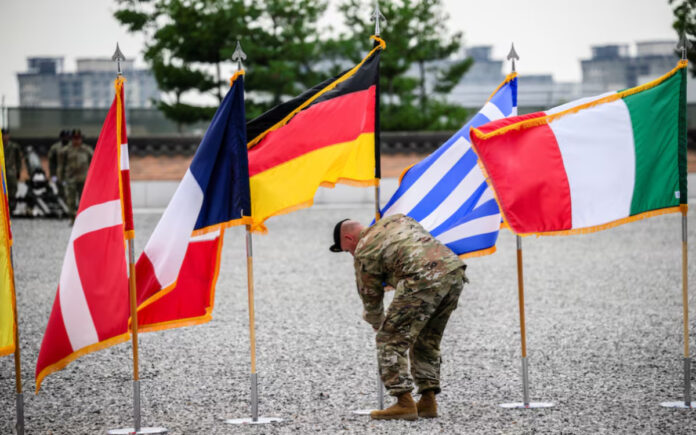Pyeongtaek: Germany has officially joined the U.S.-led United Nations Command (UNC) in South Korea, becoming the 18th nation in this coalition tasked with overseeing the heavily fortified border with North Korea and pledging to defend South Korea in the event of war. The announcement was made on Friday, marking a significant step in Berlin’s commitment to global security.
In a ceremony held at the main U.S. military headquarters in Pyeongtaek, south of Seoul, Defence Minister Boris Pistorius emphasized the importance of global unity. “I’m convinced that especially in times like these, when the world is shaped by crises and wars, we need to show unity, we need to stand firm against those who want to undermine peace and stability, against those who attack our common order,” Pistorius stated.
This decision underscores Berlin’s view that European security is closely tied to the security of the Indo-Pacific region. It also reflects a broader trend of the United States and its allies working to expand their global alliances and strengthen regional security frameworks, leveraging the 74-year-old UNC for wider strategic purposes.
The UNC, established in 1950, was created to restore peace and enforce the armistice agreement while facilitating communication with North Korea. It is led by the commander of the U.S. military stationed in South Korea and operates independently of the United Nations.
“The addition of Germany diversifies the perspectives and resources available to the United Nations Command and enhances our collective expertise and capabilities,” said U.S. Army General Paul LaCamera, commander of the UNC and United States Forces Korea.
South Korea and the United States view the UNC as increasingly significant amid global geopolitical tensions, particularly as autocracies challenge democratic norms, according to Ramon Pacheco Pardo of King’s College in London. “On top of that, Germany now sees South Korea as one of its two top Asian partners,” Pardo added.
Also Read | Putin Leads Comprehensive Overhaul of Russia’s Naval Forces
Tobias Bacherle, a member of Germany’s parliamentary foreign affairs committee, highlighted the importance of standing against autocratic alliances, referencing North Korea’s recent military cooperation with Russia. “The brutal effects of North Korea’s recent military cooperation with Russia show countries must stand against such autocratic alliances globally,” Bacherle told Reuters.
The U.S. and its allies have accused Russia of using North Korean-made weapons, such as ballistic missiles and artillery shells, in Ukraine. “It illustrates how closely intertwined security situations across different parts of the world are,” Bacherle noted.
Also Read | Nigeria Police on High Alert, May Call for Military Aid Amid Protests
Regional tensions are further compounded by North Korea’s characterization of the UNC as a “U.S. tool for confrontation” and an “illegal war organization”, and China’s concerns about increasing military ties between NATO members and Asian nations. Last month, China’s foreign ministry cautioned NATO against creating chaos in the Asia-Pacific region following turmoil in Europe.
In response to concerns that heightened European military involvement in the region might escalate tensions, Pistorius assured reporters that there was “no reason to feel provoked by this decision.” The specific role of German troops in the region has yet to be determined, according to a German embassy spokesperson in Seoul.



